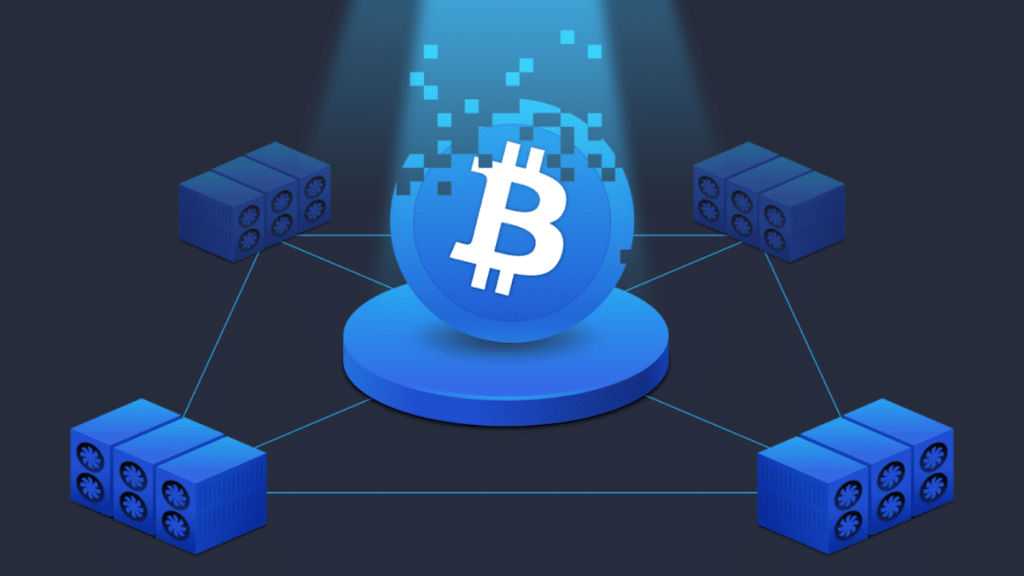Bitcoin mining is a crucial process that helps secure the entire network. Through mining, transactions are validated, and the decentralized system is protected from fraud. This article explores how mining works and why it’s essential for maintaining the security and integrity of the network. It also highlights the incentives that keep miners engaged and the technologies that make the process both efficient and reliable.
Understanding Bitcoin Mining
To understand how it works, you should first need to understand what is Bitcoin. It is a decentralized digital currency that functions without the control of any central authority, such as a bank or government. Mining is the process through which new bitcoins are created and added to the network. Miners utilize powerful computers to solve intricate mathematical problems, referred to as cryptographic puzzles. This process validates the transaction and helps secure the network.
Mining is a crucial aspect of the Bitcoin ecosystem because it ensures that transactions are legitimate and that the network remains decentralized. Without mining, this asset would lack a mechanism for validating transactions and maintaining a trustworthy public ledger. Miners are the backbone of the entire system, ensuring the integrity and security of the decentralized network.
The Role of Proof of Work in Bitcoin Mining
At the heart of Bitcoin mining is a system called Proof of Work (PoW). In this system, miners compete to solve cryptographic puzzles. When a miner successfully solves the puzzle, they can add a new block of transactions to the blockchain. This process not only verifies the legitimacy of the transactions but also makes it extremely difficult to alter the blockchain.
Proof of Work is essential for preventing fraud and double-spending. It ensures that no one can manipulate the system by changing past transactions. The difficulty of the puzzles increases over time, which makes it progressively harder to mine the asset and secure the network. This is what makes Bitcoin mining a reliable method for maintaining a trustworthy and secure decentralized network.
Mining and Transaction Verification
Each time a user sends Bitcoin, the network must verify the transaction. Miners validate these transactions by solving intricate mathematical puzzles. When a puzzle is solved, the miner adds the transaction to the blockchain, confirming that the transfer is legitimate.
By validating transactions, miners prevent fraud and ensure that only valid transactions are recorded on the blockchain. This process is essential for maintaining the integrity of the network. Without miners verifying transactions, the network could be subject to fraudulent activity, undermining trust in the entire system.
How Bitcoin Mining Secures the Network
The decentralized nature of Bitcoin means that there is no central authority, such as a bank, overseeing transactions. Instead, miners play a key role in securing the network. By validating and adding transactions to the blockchain, they ensure that the entire system remains trustworthy and free from manipulation.
Mining also protects the network from attacks. In order to alter the blockchain, an attacker would need to control more than half of the network’s computing power, a scenario known as a 51% attack. This is highly unlikely due to the enormous computational resources required. As the network grows, the difficulty of mining increases, making such attacks even more difficult to execute.
Rewards and Incentives for Miners
Miners are incentivized to participate in the Bitcoin network through rewards. When a miner successfully solves a cryptographic puzzle, they are rewarded with newly minted bitcoins and transaction fees from users. The reward serves as compensation for the time and resources spent mining.
The Bitcoin reward system decreases over time. Miners were initially rewarded with 50 bitcoins per block, but this reward is halved approximately every four years in an event called the “halving.” Miners currently receive 6.25 coins per block, and this number will continue to decrease until the maximum supply of 21 million coins is reached. These reward reductions are built into the system to control inflation and ensure that the total supply of Bitcoin remains fixed.
How Can a Reliable Platform Help in Bitcoin Mining?
When it comes to mining Bitcoin, having access to a reliable platform can make a world of difference. A trusted platform provides the necessary tools for miners to connect with the network and efficiently validate transactions. These platforms typically offer mining software, hardware recommendations, and support to help miners optimize their operations.
Whether an individual miner is just starting or an experienced professional is scaling up, the right platform can help manage resources, monitor performance, and ensure mining profitability. A dependable platform ensures that miners can focus on the task at hand—securing the network and earning rewards—while providing the infrastructure needed to succeed in the competitive world of Bitcoin mining.
Many wonder what is Bitcoin and how the mining process works. It’s the backbone of the decentralized network, ensuring security, integrity, and trust in the system. It remains a vital component of the Bitcoin ecosystem, ensuring that the system remains decentralized and secure. As the industry continues to evolve, mining will play an increasingly important role in maintaining the network’s integrity, stability, and growth.
